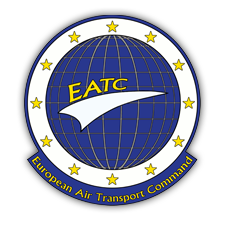Captain Xavier is currently detached to the Multinational Caribbean Coordination Cell (MNCCC) in Curacao. His mission started on 23 September and will end late October 2017. Captain Xavier fills the position of an air transport expert in the MNCCC.
The MNCCC was put up to respond to the devastation caused by the hurricanes in the Caribbean. The cell coordinates and optimizes the use of ships and aircraft that deliver emergency aid to the affected area. The MNCCC is based at the Dutch Naval Base Parera in Curacao and is active for up to two months.
Captain Xavier joined the MNCCC on request of the French Air defence and operation command. He was a perfect choice for the position at the MNCCC : he is an experienced highly professional flight controller in EATC’s 24/7 mission control centre and supports with its vast experience of planning and tasking missions.
Captain Xavier, two weeks after the hurricanes raged in the Caribbean you were sent to Curacao to coordinate and optimise the transportation of emergency aid coming from allied member states or humanitarian relief organisations. What did you experience upon your arrival?
When I arrived on 23 September, the MNCCC was still in the built-up phase. My first objective was to meet my colleagues from France, the Netherlands and the UK. We started exchanging experience and views on our common objective and collaboration.
We quickly understood that our main goal would be to use the available ‘empty space’ in the operating assets. This was to implement the quick and efficient transportation of goods to the populations of Saint-Martin, Dominica and other islands impacted by the hurricane Irma. We also responded to the needs of the military support to the local population (spare parts, tools, etc…).
We got rapidly in contact with the national executing agencies that were already working on emergency needs for the past two weeks. We offered a close cooperation to them : although they had their own transportation assets in place, they could also rely on the allied assets to deliver cargo or personnel. The overall aim was to improve the efficiency of their relief operations.
Can you please describe your role athe MNCCC?
I have to match existing flights with the different requests that the MNCCC receives from nations. And this is exactly my background at EATC : matching offers and requests. So my knowledge and expertise from EATC were of real advantage for my position here in Curacao.
How do you experience the multinational cooperation in the aftermath of this natural disaster?
Within the MNCCC I experience a real multinational spirit. The challenges, and in particular to understand the most urgent priorities and to react consequently, united us strongly.
Then the MNCCC is also a perfect example of how nations can pool and share assets, support each other and improve the efficiency of humanitarian relief operations. And at the end of the day, this is the most important : that we support in the most effective and efficient way the population in the affected regions.
How do EATC’s member nations worked together during these relief operations?
EATC’s member nations have been working together over years within EATC. They know each other and interaction between them is straightforward. Understanding the operating processes of other non-EATC nations like Canada and the UK was something new and interesting to learn.
I would like to give you an example of how easy-going the EATC nations worked together.
A Belgian aircraft headed to Dominica in order to deliver Belgian cargo. I noticed this mission in the overall EATC mission schedule (Belgium being an EATC member nation). On the other hand the MNCCC had received an urgent request from the Red Cross and we were looking for a solution.
So we planned to delay the return flight of the Belgian aircraft and tasked the Belgians to do a dedicated mission in order to respond to the Red Cross needs. This was possible because the Belgian aircraft was under EATC command and control. EATC processes facilitated the change in a really short delay between decision and action. Thanks to the perfect cooperation between the MNCCC, EATC and Belgium, the Red Cross had food, hygiene products and children care goods delivered urgently to the population.
What do you take out personally from your mission to Curacao?
This mission to Curacao was a great opportunity to improve my knowledge in a multinational environment and to exercise, in a specific emergency situation, the expertise I acquired at EATC.
Processes, organisation, structure and general working methods applicable at EATC have demonstrated, in my opinion, their effectiveness and efficiency when applied in a larger multinational context.
Captain Xavier, we thank you very much for this interview and wish you good luck for the rest of your detachment.

